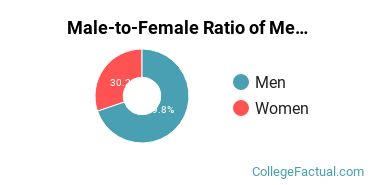 by our College Data Analytics Team
by our College Data Analytics TeamThe main focus area for this major is General Metallurgical Engineering. For more details on this concentration, visit its profile page.
Metallurgical Engineering is a major offered under the engineering program of study at Colorado School of Mines. We’ve gathered data and other essential information about the bachelor’s degree program in metallurgical engineering, such as diversity of students, how many students graduated in recent times, and more.
You can jump to any section of this page using the links below:
In order to help students and their parents find the best school for them, we have created several different types of college rankings, which are updated yearly. According to College Factual's most recent rankings, Mines is the best school in the United States for metallurgical engineering majors working on their bachelor's degree. It is also ranked #1 in Colorado.
Here are some of the other rankings for Mines.
In 2019-2020, the average part-time undergraduate tuition at Mines was $1,245 per credit hour for out-of-state students. The average for in-state students was $555 per credit hour. The average full-time tuition and fees for undergraduates are shown in the table below.
| In State | Out of State | |
|---|---|---|
| Tuition | $16,650 | $37,350 |
| Fees | $2,450 | $2,450 |
| Books and Supplies | $1,500 | $1,500 |
| On Campus Room and Board | $14,720 | $14,720 |
| On Campus Other Expenses | $1,879 | $1,879 |
Learn more about Mines tuition and fees.
One factor in determining the overall cost in a degree is to consider how much in student loans you’ll have to take out. Students who received their bachelor’s degree at Mines in Metallurgical Engineering walked away with an average of $22,500 in student debt. That is 12% higher than the national average of $20,130.

The median early career salary of metallurgical engineering students who receive their bachelor’s degree from Mines is $66,701 per year. That is 3% lower than the national average of $68,650.

Online degrees for the Mines metallurgical engineering bachelor’s degree program are not available at this time. To see if the school offers distance learning options in other areas, visit the Mines Online Learning page.
About 30.2% of the students who received their BS in metallurgical engineering in 2019-2020 were women. This is higher than the nationwide number of 27.0%.

Racial-ethnic minority graduates* made up 9.3% of the metallurgical engineering bachelor’s degrees at Mines in 2019-2020. This is lower than the nationwide number of 20%.

| Race/Ethnicity | Number of Students |
|---|---|
| Asian | 1 |
| Black or African American | 0 |
| Hispanic or Latino | 3 |
| Native American or Alaska Native | 0 |
| Native Hawaiian or Pacific Islander | 0 |
| White | 38 |
| International Students | 0 |
| Other Races/Ethnicities | 1 |
Metallurgical Engineering students may decide to major in one of the following focus areas.
| Focus Area | Annual Graduates |
|---|---|
| General Metallurgical Engineering | 43 |
You may also be interested in one of these majors related to metallurgical engineering.
| Related Major | Annual Graduates |
|---|---|
| General Engineering | 2 |
| Biomedical Engineering | 36 |
| Chemical Engineering | 104 |
| Civil Engineering | 67 |
| Electrical Engineering | 77 |
*The racial-ethnic minorities count is calculated by taking the total number of students and subtracting white students, international students, and students whose race/ethnicity was unknown. This number is then divided by the total number of students at the school to obtain the racial-ethnic minorities percentage.
More about our data sources and methodologies.